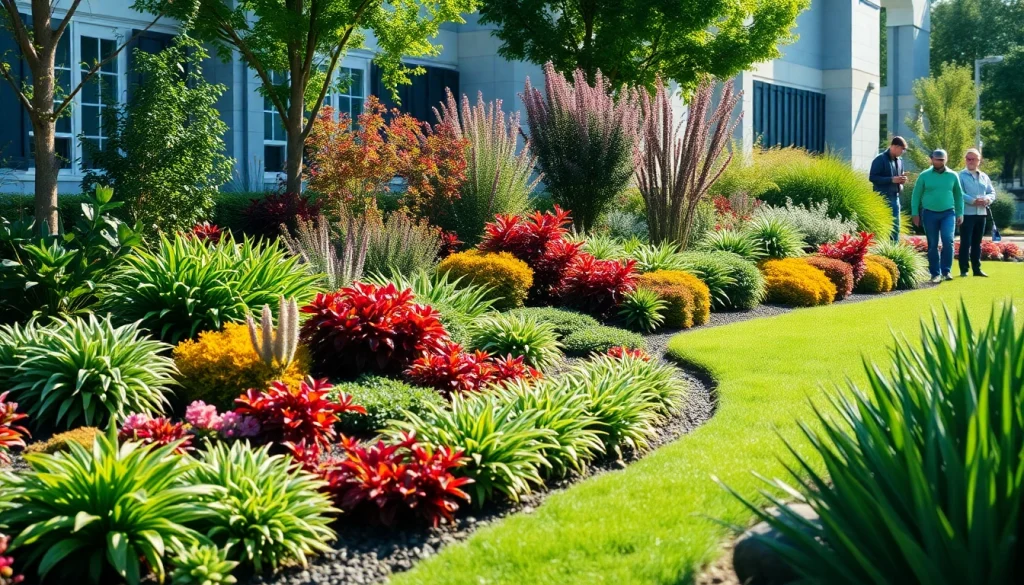Understanding Commercial Landscaping
Commercial landscaping is more than just planting a few trees and mowing the lawn—it’s a vital part of creating an inviting exterior that reflects your business identity. Investing in commercial landscaping contractors can drastically elevate your business’ aesthetic appeal and functionality, drawing in customers while fostering a welcoming environment. Let’s dive deeper into what constitutes commercial landscaping, its benefits, and the distinctions from residential landscaping.
What Are Commercial Landscaping Contractors?
Commercial landscaping contractors are specialized professionals who design, construct, and maintain landscapes on commercial properties. They possess a deep understanding of horticulture, environmental design, and landscaping technology. These experts cater to various industries, including retail, hospitality, offices, and more. Their services range from basic lawn care and plant installation to intricate landscape architecture involving hardscaping, irrigation systems, and seasonal decorating. Unlike residential contractors, commercial contractors focus on projects at a larger scale and must align their designs with corporate branding and functionality.
Benefits of Professional Landscaping for Businesses
Professional landscaping offers myriad benefits that extend beyond pure aesthetics:
- Enhanced Curb Appeal: A well-manicured landscape increases first impressions, attracting potential customers.
- Increased Property Value: Quality landscaping can significantly increase a property’s market value, an advantageous factor for business owners.
- Eco-Friendly Impact: Thoughtfully designed landscapes can improve air quality and reduce temperature, contributing positively to the environment.
- Employee Satisfaction: Green spaces can enhance employee productivity and morale, creating a healthier workplace.
- Brand Differentiation: Unique landscaping can reflect a brand’s identity and core values, helping businesses stand out from competitors.
Key Differences Between Residential and Commercial Landscaping
The landscape requirements for commercial properties differ significantly from those of residential spaces. Here are some key distinctions:
- Scale and Scope: Commercial landscapes are often larger and require more detailed planning and execution.
- Regulatory Compliance: Commercial properties may need to adhere to stricter zoning laws and regulations pertaining to land usage.
- Maintenance Needs: Commercial landscaping typically requires ongoing maintenance with a tailored schedule to accommodate higher traffic volumes and usage needs.
- Design Intent: The design of commercial landscapes is often more functional, aimed at facilitating customer flow, enhancing safety, and upholding brand identity.
Choosing the Right Commercial Landscaping Contractors
Criteria for Selection: Experience and Expertise
Choosing the right commercial landscaping contractor is a critical decision that can influence the outcome of your project. It’s essential to evaluate their experience and expertise thoroughly. Look for contractors with a demonstrated history of successful projects similar to yours, as well as credentials such as certifications from recognized landscaping associations. Experience in commercial landscaping is vital; these professionals should be familiar with the challenges and requirements specific to business properties.
Questions to Ask Potential Contractors
During your selection process, consider asking potential contractors the following questions:
- What is your experience with commercial landscapes similar to mine?
- Can you provide references from previous commercial clients?
- Do you have insurance and necessary licenses to operate in this area?
- What is your approach to project management and communication?
- Can you provide a detailed, written contract outlining the scope of work?
Comparing Quotes and Services Offered
When comparing bids from different commercial landscaping contractors, look beyond the price. Consider the services they provide, including design, installation, and maintenance options. Be sure to assess any additional services, such as sustainability practices and eco-friendly landscaping techniques. Understanding the full value provided by different contractors ensures you make an informed decision that aligns with your budget and project needs.
Designing Your Commercial Landscape
Essential Elements of Effective Landscaping
An effective commercial landscape design integrates several crucial elements that work together harmoniously:
- Plant Selection: choose native plants that are well-suited to the local climate, require less maintenance, and provide seasonal interest.
- Hardscaping: Incorporate features such as pathways, patios, and retaining walls that enhance functionality while providing aesthetic appeal.
- Water Features: Ponds, fountains, and water walls can create a calming atmosphere, enhancing the overall landscape’s appeal.
- Outdoor Lighting: Incorporate lighting for safety and curb appeal, highlighting landscape features and ensuring visibility for nighttime visitors.
Incorporating Environmental Sustainability
With increasing awareness of environmental issues, integrating sustainability into your landscape design is essential:
- Climate-Appropriate Planting: Select plants that thrive in your region to ensure minimal water and fertilizer needs.
- Effective Irrigation Systems: Implement irrigation solutions like drip systems that conserve water while keeping the landscape healthy.
- Use of Recycled Materials: Whenever possible, use recycled or locally-sourced materials for hardscapes.
- Pollinator Gardens: Create spaces that attract beneficial insects and birds to support local ecosystems.
Creative Ideas for Unique Outdoor Spaces
To stand out, consider implementing some creative ideas in your commercial landscape:
- Outdoor Workspaces: Design areas that allow employees to work outside, promoting productivity and a pleasant work environment.
- Interactive Features: Incorporate elements like sculptures or seating areas that encourage social interaction and engagement.
- Themed Gardens: Develop a specific theme that aligns with your brand to enhance recognition and appeal.
- Seasonal Displays: Use seasonal plants and decor to keep the landscape dynamic throughout the year, adapting to different festivities.
Executing a Successful Landscaping Project
Project Planning and Timeline Management
A successful landscaping project begins with meticulous planning. Establishing a clear timeline and project stages is vital:
- Initial Consultation: Meet with your landscaping contractor to discuss needs, goals, and budgets.
- Design Development: Work collaboratively on landscape designs based on your input and the contractor’s expertise.
- Implementation Planning: Develop a phased implementation plan to ensure no disruption to your business operations, especially if excavation or major changes are involved.
Collaborating with Your Contractors for Best Outcomes
Open communication with your landscaping contractors throughout the project is essential. Regular check-ins help address concerns promptly and keep the project on track. This collaboration can include:
- Progress assessments at various stages to ensure alignment with visions.
- Talk through any design modifications needed on the go, reacting to unexpected landscaping issues or opportunities.
- Schedule timely maintenance checks to ensure the landscape grows as intended post-installation.
Common Challenges and How to Overcome Them
No landscaping project is without its challenges. Being proactive can help mitigate issues:
- Weather Delays: Have a flexible timeline to accommodate weather uncertainties that may impact construction.
- Budget Overruns: Maintain a contingency budget (usually around 10%) to cater for unexpected costs.
- Design Changes: Expect to make adjustments as the project unfolds; maintain a clear communication line with your contractors.
- Site Limitations: Each site presents unique challenges; work with your contractors to find creative solutions that work within these constraints.
Maintaining Your Commercial Landscape
Routine Maintenance Best Practices
Maintaining your commercial landscape is key to ensuring longevity and visual appeal:
- Regular Inspections: Check plant health and landscape features regularly to catch issues early.
- Consistent Fertilization and Watering: Develop a custom maintenance plan that accounts for seasonal changes and specific plant needs.
- Weed Control: Implement preventative measures against weeds, including mulching and regular treatments.
- Seasonal Adjustments: Adapt maintenance practices as seasons change; think about mulching, pruning, or installing winter protection as needed.
When to Call in the Professionals
While routine maintenance can often be managed in-house or with minimal staffing, some situations may necessitate the expertise of professionals:
- Complex irrigation system repairs or installations.
- Significant changes to the landscape requiring professional design input.
- Expertise in pest control or disease management for larger infestations.
- Seasonal installations, such as outdoor decorations for holidays, demanding extensive design skills.
Measuring the ROI of Your Landscaping Investment
Understanding and measuring the return on investment (ROI) for your landscaping project can justify budget allocations and inform future improvements. Key metrics can include:
- Increased Foot Traffic: Analyze foot traffic before and after landscaping to determine its impact on customer visitation.
- Property Value Increase: Work with real estate agents to evaluate the pre- and post-landscaping property values.
- Employee Retention: Assess employee satisfaction surveys for any trends correlating to improvements in the workspace environment.
- Reduced Energy Costs: Calculate savings from energy-efficient landscaping practices like strategically placed trees for shade.





